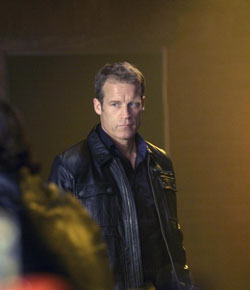Movies /
Home Theatre
Human Target Episode 2: The Wife's Tale
By Beth Davies-Stofka
November 26, 2010 - 19:36
Episode 2 of the new season of
Human Target really delivered. Chance takes on the case of Rebecca Brooks, a widowed economics professor. The team doesn't know who ordered the hit, or why, but Chance insists on protecting her anyway. You see, it was Chance who killed her husband seven years ago. This creates moral and emotional difficulties for the new boss, Ilsa Pucci. Indira Varma's Pucci has some fantastic dramatic scenes with Chi McBride's Winston, who struggles to clarify the nature of the protection business for his new boss. Meanwhile, Ames brings the humor through her puppy-like efforts to win Guerrero's respect and admiration, or at least get him to notice her.
The episode casts stuntman Adrian Hein as the assassin. Hein is terrific, and it's so nice to see stunts performed without need of a stunt double. The first chase of the episode is set in a multi-tiered parking garage. Chance and Rebecca are in a car, while Hein's assassin chases them on foot. He runs with single-minded determination, drops from one floor of the garage to the next on an outside wall, and when Chance drives directly at him, he runs right over the car. He leaps from the car's roof with the grace of Baryshnikov, turning back in mid-air to continue his murderous assault.
Because this episode puts Chance's character and motives front and center, I was moved to ponder just what it is that makes him such an interesting hero. Here is a man who doesn't believe that he deserves to live. He's taken too many lives. Yet he goes on living because his job – protecting people in trouble – actually demands that he survive. He's just no good to his clients dead.
This peculiar relationship between Chance's past and present ensures that he is not the usual self-sacrificing hero. There's too much of both self-destructiveness and hope to his character.
So why is he so worthy of our admiration, and so worthy of the loyalty of Winston and Guerrero, two men who, at least on the surface, could not be further apart on the moral landscape? I think it has a lot to do with the strength and the virtue that Chance shows in the face of his reality. In fact – and this may surprise you – Chance's best qualities remind me of some of the things Jesus taught to his disciples. I'm thinking in particular of Chapter 6 of the Gospel of Luke, where Jesus tells his disciples:
29 If someone slaps you on one cheek, turn to them the other also. If someone takes your coat, do not withhold your shirt from them. 30 Give to everyone who asks you, and if anyone takes what belongs to you, do not demand it back. 31 Do to others as you would have them do to you.
Ilsa is shocked when Chance stands quietly while Rebecca Brooks bawls him out, because Ilsa doesn't think Chance deserves the tongue-lashing. But Chance turns the other cheek. He doesn't forget that he's protecting Rebecca.
He also gives protection to everyone who asks. He does it without praise or recognition, and often risks his life without receiving compensation or even thanks. When Ilsa suggests that the man Chance shot might have been a cruel, self-centered liar, Chance responds, "It doesn't forgive me for what I did." Chance fully understands the value of a single human life, and rejects the idea that the character of the victim excuses the executioner.
I'd never go so far as to insist that Chance is a disciple of Christ. The evidence isn’t there. Instead, I think that the sense of hope that helps Chance get up out of bed and do good in the world every day of his life – a quality that really endears him to me – is precisely the hope that Jesus awakened in his followers. Through Jesus' teachings, the disciples were encouraged to live by new values. They were encouraged to turn away the world's values – money, vengeance, strength, pride, and exploiting the vulnerable. Jesus encouraged his followers to live according to God's values. He told them:
37 Do not judge, and you will not be judged. Do not condemn, and you will not be condemned. Forgive, and you will be forgiven. 38 Give, and it will be given to you. For with the measure you use, it will be measured to you.
I'm used to the ways in which many of DC's comics proffer an essentially Jewish philosophy, and in a sense this is a great example. After all, Jesus was a devout Jew who preached the values of the Jewish God and the Jewish scriptures. But Chance's desire for redemption smacks of something a little more Christian, because it is centered on redemption. It suggests the hope that good people can redeem the world by bringing forth the "Kingdom of God," the promised life in which no one goes hungry, and the vulnerable are safe from liars, thieves, predators, and oppressors armed with guns and malice.
Chance, Winston, and Guerrero know every bloody feature of the world they live in. They know it to the point of weariness, or maybe in Guerrero's case, boredom. Ilsa asks Winston, "How is [Chance] okay with it?" With what?, Winston asks. Shrugging as she looks for the words, Ilsa replies, "All of it." And Winston tells her:
"He's not. None of us are. That's why we try to make things right when we can. If we can."
It's hard to imagine a better job description for a follower of Christ. But as Ilsa muses, and as we shall likely find out, redemption must come with a price.
Rating: 9 /10
Last Updated: January 17, 2025 - 08:20
